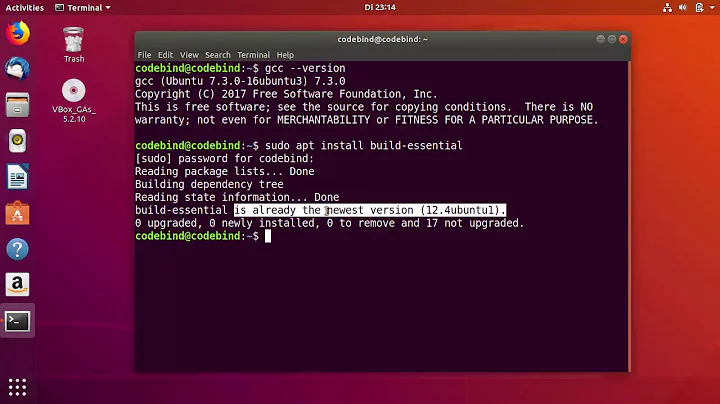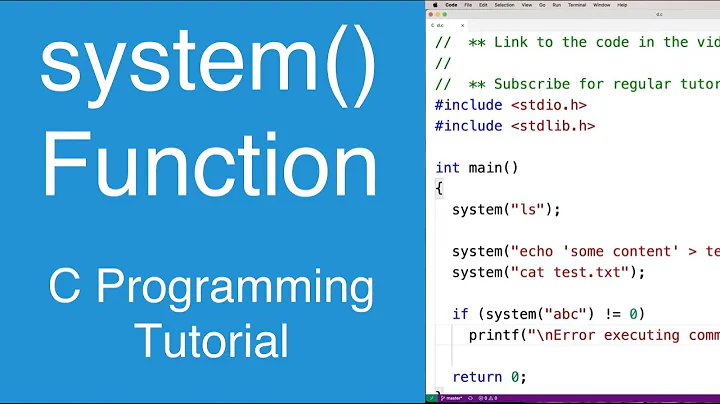Running a shell command in a c program
13,807
Solution 1
fork() and system() is what you need
Solution 2
Sure, just fork and exec: use fork to create a new process and, in the child process, use exec to start the shell with your command. execv takes the arguments you would normally give to the shell.
Your code could look like this:
pid_t child_pid = fork();
if (child_pid == 0)
{ // in child
/* set up arguments */
// launch here
execv("/bin/sh", args);
// if you ever get here, there's been an error - handle it
}
else if (child_pid < 0)
{ // handle error
}
the child process will send a SIGCHLD signal when it dies. This code quoted from the POSIX standard (SUSv4) will handle that:
static void
handle_sigchld(int signum, siginfo_t *sinfo, void *unused)
{
int status;
/*
* Obtain status information for the child which
* caused the SIGCHLD signal and write its exit code
* to stdout.
*/
if (sinfo->si_code != CLD_EXITED)
{
static char msg[] = "wrong si_code\n";
write(2, msg, sizeof msg - 1);
}
else if (waitpid(sinfo->si_pid, &status, 0) == -1)
{
static char msg[] = "waitpid() failed\n";
write(2, msg, sizeof msg - 1);
}
else if (!WIFEXITED(status))
{
static char msg[] = "WIFEXITED was false\n";
write(2, msg, sizeof msg - 1);
}
else
{
int code = WEXITSTATUS(status);
char buf[2];
buf[0] = '0' + code;
buf[1] = '\n';
write(1, buf, 2);
}
}
Solution 3
What about simply amping the command with system ("command &")?
Solution 4
Try code like this:
#include <stdlib.h>
#include <unistd.h>
int main(int argc, char ** argv)
{
if (!fork())
{
execv("ls", {"myDir"}); /* Your command with arguments instead of ls. */
}
}
Related videos on Youtube
Author by
wonnie
Updated on June 04, 2022Comments
-
wonnie almost 2 years
I want to run a shell command in my c program. But the thing is that i don't want to make my program wait until the command performed. No need to read the shell command's output (it returns no data anyway) So basically, is that possible?
-
Jens about 13 yearsBTW, it does not matter if you want to run a shell command or some other executable. Whether you use
system()or thefork()/exec()approach, all that's required is an executable. Maybe you want to edit the title of your question accordingly?
-
-
PhD about 13 yearsAlong with exec() or its variants, probably.
-
rlc about 13 years
systemwould have the child process wait for the shell command -execwould replace the child process with the shell.. -
Stefano Borini about 13 years@Ronald: no. It replaces the child process with another process. It's not clear from the OP if he wants to run another program or a shell command line, but if it's the latter, then only system() will do the trick. exec does not involve the shell.
-
Stefano Borini about 13 yearsexec does not involve the shell. suppose the OP wants to run
ls | grep -v hello. This will work with system, but will not work with exec. -
rlc about 13 yearsit will if you pass it the proper arguments (i.e. start /bin/sh and pass it the script you want to run).
-
rlc about 13 yearsthe OP can pass those to the shell - system does the same thing (but does another
fork&execbehind the scenes). -
Jens about 13 yearsThis strikes me as too quick and dirty as this would create a zombie process from the time the command exits until main exits. A well-behaved Unix program would want to avoid that. See other answers that use
waitpid.





